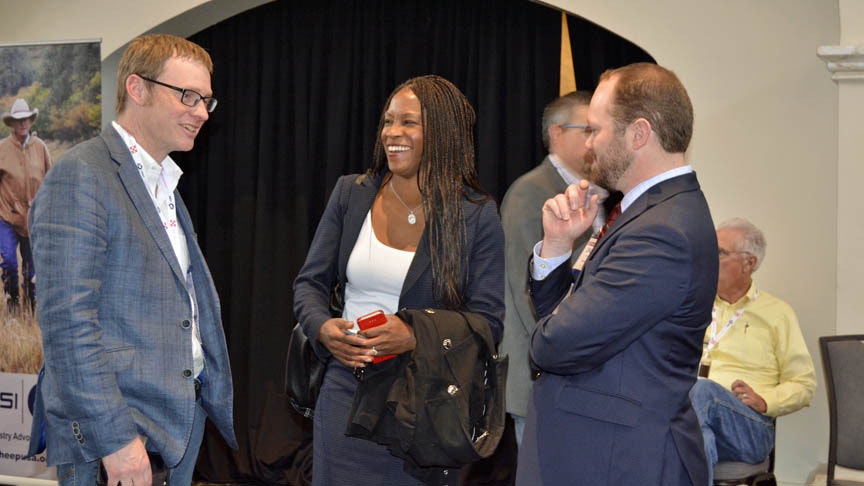U.S. Fish & Wildlife Service Director (FWS) Aurelia Skipwith’s recent address at a meeting of the American Sheep Industry Association (ASI) convention in Arizona gave reason for conservatives to cheer in hope – and for liberals to cringe in despair and send out fundraising letters in outrage.
Skipworth was confirmed as FWS Director in December 2019, and her unannounced visit to an ASI committee meeting has not been covered in depth by any media outlet. {It’s a sheep industry convention, so who would want to cover that? Answer: Yours truly, apparently the only media rep in that particular committee meeting.}
For a quick rundown on Skipwith’s bona fides, know that she got a bachelor’s degree in biology from Howard University before obtaining a master’s degree in molecular biology from Purdue, and a doctorate from the University of Kentucky’s College of Law.

She’s been involved in using scientific advances to improve agricultural output and feed humans around the globe as co-founder of AVC Global (an agricultural value chain company), and in roles at Alltech, US Agency for International Development, Gage International, US Foreign Agricultural Service, and Monsanto (crop sciences).
Skipwith came to the Department of the Interior in the Trump Administration as deputy assistant secretary of fish, wildlife, and parks. Skipwith’s fiancé is a member of a longtime sheep-ranching family from the southeastern Montana’s metropolitan region of Alzada (population about 30).
Speaking to a group of our nation’s sheep producers, Skipwith focused on the importance of private lands, and working with landowners and state agencies in conservation efforts.
“We believe in property rights, and landowner rights,” she said. “We understand about keeping working lands working.” With 80 percent of the habitat for the nation’s 1,600 imperiled species found on private land, Skipwith noted that effective conservation comes from engaging with people who work the land and accommodating the needs of people while working to conserve wildlife.
FWS is the federal agency charged with conserving threatened and endangered species, but also manages the national wildlife refuge system, significant fisheries, and migratory birds.
Skipwith cited regulatory changes to the Endangered Species Act rolled out by her agency last year as part of an overall effort to provide regulatory predictability.
“We want to make sure that they are clear and effective, and that they do not impose undue burdens to people on the ground,” she said. Skipwith said that her agency’s decisions need to be based on sound science, the rule of law, and common sense.
“We are committed to strengthening and expanding our array of tools and incentives” for working with landowners, Skipwith said, including seeking out innovative partnerships for species conservation.
Last year’s regulatory changes were a start. “That was just the first traunch,” Skipwith said.“We have more that are coming.”
“I’ve been at the department for about three years now, and one thing that I can tell you I get tired of seeing on a regular, everyday basis, is the same cadre of environmental groups that come to say that we’re not doing something right,” Skipwith said. “They are constantly filing lawsuits – which does nothing but waste taxpayer dollars. They are making law firms rich, and they are funding these liberal extremist groups. And I will say that it does nothing for the environment, it does nothing to protect our species, and it does nothing to protect the habitat on which they depend.”
“When we make our announcement to delist, I know that in less than a day, there will be a lawsuit announced that the species needs to stay on the Endangered Species list,” she said. “That was not the intent of the Endangered Species Act. Getting a species off the list is something that should be celebrated, not something that should be followed with a lawsuit. I find that absolutely disgusting, at the end of the day.
“So I can assure you that we will fight the extremist groups that constantly file these lawsuits because the decisions that we make at the Department Of the Interior are based on sound science, and are based on the rule of law,” she said. “I know that’s one of the reasons that the president nominated me: because I am willing to fight.”
“I am keenly aware of the threats that is posed by extreme environmental groups, but I am also aware of the threats that large predators can pose to your livelihood as well,” she said. “I want to make sure that our position is clear: The grizzly bear has been recovered. The science shows that and we will fight to make sure that it’s delisted.
“We also believe that the gray wolf is biologically recovered and that is why it should also be removed from the list,” she said. “That is another success of the Endangered Species Act, but like the grizzly bear, due to litigation it still remains either federally listed as threatened or endangered, and so we are working really hard to make sure we can get it off the list.”
Skipwith received a standing ovation at the conclusion of her remarks.
Cat Urbigkit is an author and rancher who lives on the range in Sublette County, Wyoming. Her column, Range Writing, appears weekly in Cowboy State Daily. To request reprint permission or syndication of this column, email rangewritesyndicate@icloud.com.





